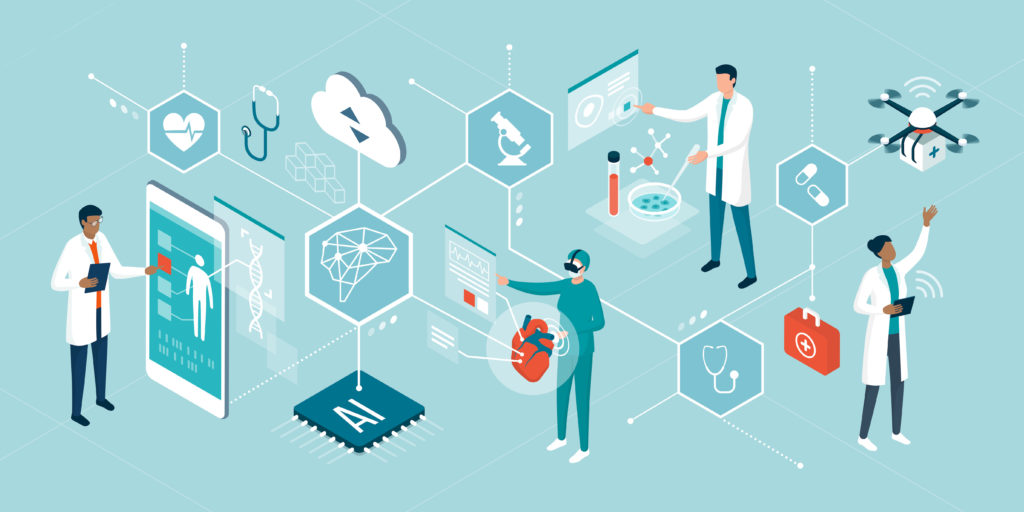Healthcare RCM: Optimize Earnings Cycle Administration for Better Results
Wiki Article
Unveiling the Perks of Medical Care RCM in Improving Performance and Precision in Earnings Cycle Management
In the swiftly developing medical care landscape, the significance of Profits Cycle Monitoring (RCM) can not be overstated. As health care carriers strive for accuracy and performance, RCM emerges as a critical device in streamlining operations, reducing mistakes, and boosting financial results.
Simplifying Administrative Tasks

On top of that, the combination of electronic health and wellness documents (EHR) with RCM systems promotes real-time data access and sharing, enabling health care experts to make educated choices without delay. This interconnectedness not just boosts interaction in between administrative and clinical teams however also improves client contentment by lowering waiting times and billing discrepancies - Healthcare RCM. Moreover, streamlined administrative processes permit much better conformity with regulative criteria, mitigating threats connected with audits and charges
Inevitably, the emphasis on refining management jobs in RCM brings about set you back financial savings and boosted economic efficiency. By spending in automation and maximizing operations, healthcare companies can attain a much more lasting profits cycle, ensuring long-term viability and the capability to adapt to progressing market needs.
Enhancing Cases Handling
How can medical care companies improve the performance of their insurance claims handling? The combination of advanced Earnings Cycle Administration (RCM) systems supplies a robust solution. By using automation and advanced analytics, RCM systems simplify the complicated and frequently difficult insurance claims refining tasks. Automation lowers hands-on information entrance errors, makes certain compliance with the newest payment codes, and speeds up the overall claims lifecycle from entry to compensation.Moreover, real-time analytics play an essential duty in improving claims refining performance. These analytics tools give insights right into bottlenecks and possible denials, enabling doctor to attend to concerns proactively. Anticipating analytics can forecast patterns in case rejections, enabling preemptive steps to alleviate them, thus minimizing the time taken for insurance claims to be processed and authorized.
In addition, the fostering of digital wellness documents (EHR) incorporated with RCM systems ensures seamless information circulation, reducing redundancies and increasing the precision of information submitted in claims. A consistent feedback loop facilitated by RCM systems further refines the process, fostering continuous improvement.
Inevitably, by leveraging technology-driven services in insurance claims refining, health care companies can improve operational efficiency, improve capital, and provide a smoother experience for individuals and team alike.
Reducing Financial Errors
Accurate financial administration is essential in healthcare, where reducing financial mistakes can dramatically influence functional success. Monetary errors, whether due to incorrect payment, coding mistakes, Extra resources or mismanagement of individual accounts, can result in substantial earnings loss and stretched partnerships with individuals and payers. Addressing these errors is crucial to preserve a health care organization's financial wellness and boost its credibility.Healthcare Revenue Cycle Monitoring (RCM) plays a critical role in lessening such errors via structured processes. By implementing standard procedures for invoicing, coding, and collections, healthcare service providers can make certain that monetary purchases are handled with accuracy. Comprehensive training for staff on present coding regulations and invoicing techniques also lowers the possibility of mistakes, ensuring insurance claims are appropriately processed and repaid.

Moreover, thorough audits and routine economic reviews within the RCM framework permit the very early discovery and correction of inconsistencies. Making sure precision in person data entry and verification even more alleviates mistakes, as this is often a primary source of mistakes. By focusing on these calculated locations, medical care companies can lower financial mistakes, thereby protecting their income streams and enhancing general operational effectiveness.
Leveraging Advanced Technologies
In today's quickly developing health care landscape, leveraging sophisticated innovations is vital for enhancing Profits Cycle Administration (RCM) processes. By incorporating innovative options such as expert system (AI), artificial intelligence (ML), and robotic process automation (RPA), doctor can substantially improve the effectiveness and accuracy of their RCM operations. These technologies assist in streamlining repetitive tasks, lowering hand-operated mistakes, and making it possible for much faster handling of cases.
Moreover, the integration of blockchain technology enhances information security and openness within RCM (Healthcare RCM). It ensures that delicate details is shielded while keeping an unalterable record of deals. This is essential for building trust with patients and stakeholders
Boosting Financial Efficiency
Structure on the effectiveness acquired through innovative modern technologies, doctor can significantly increase their financial efficiency by fine-tuning their Income Cycle Management (RCM) approaches. By maximizing invoicing processes, lessening insurance claim denials, and boosting money flow, medical care organizations can achieve far better monetary security. Carrying out robust RCM remedies enables providers to simplify administrative jobs, minimizing the time and sources invested in hand-operated data access and insurance claim handling. This effectiveness leads to much faster declare submissions and repayments, optimizing income Learn More collection.Moreover, description data analytics within RCM systems supply useful understandings into functional traffic jams and economic trends. By leveraging these insights, health care providers can make educated decisions to enhance economic end results, such as readjusting billing practices or renegotiating payer contracts. Enhanced accuracy in coding and paperwork additionally lowers case rejections and audits, fostering a smooth profits cycle.
Furthermore, individual involvement devices integrated within RCM platforms enhance patient complete satisfaction by supplying clear invoicing info and adaptable settlement options. This openness not just boosts patient-provider partnerships but additionally urges prompt repayments, decreasing exceptional accounts receivables.
Conclusion
Medical Care Profits Cycle Administration substantially enhances efficiency and accuracy by simplifying management jobs and improving insurance claims processing. Via the decrease of monetary errors and the assimilation of sophisticated modern technologies such as AI and anticipating analytics, RCM helps with compliance with billing codes and gives useful insights right into economic patterns. This systematic approach not just decreases prospective insurance claim denials yet additionally increases financial efficiency, thus promoting depend on and transparency with patients and stakeholders within the health care system.As medical care providers aim for accuracy and performance, RCM emerges as a critical tool in enhancing procedures, reducing errors, and boosting financial outcomes.Simplifying administrative jobs in healthcare income cycle monitoring (RCM) provides considerable advantages by enhancing functional performance and reducing the problem on team.Healthcare Profits Cycle Monitoring (RCM) plays a pivotal function in decreasing such mistakes through structured processes.In today's swiftly advancing healthcare landscape, leveraging sophisticated modern technologies is essential for enhancing Profits Cycle Monitoring (RCM) procedures.Building on the effectiveness gotten via innovative technologies, healthcare companies can significantly enhance their economic efficiency by improving their Revenue Cycle Management (RCM) techniques.
Report this wiki page